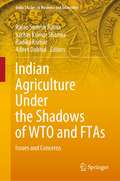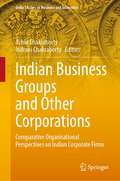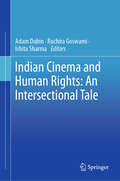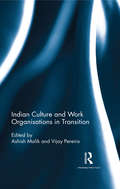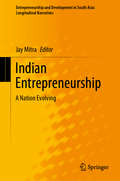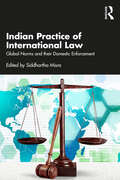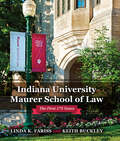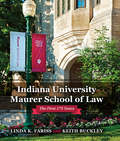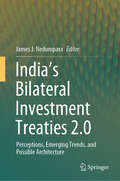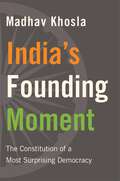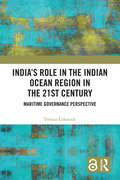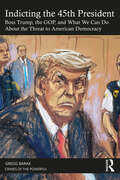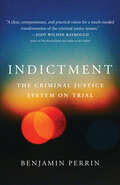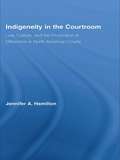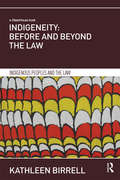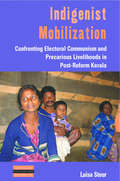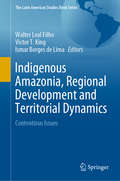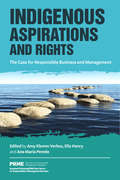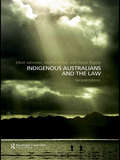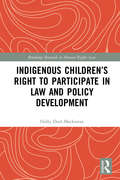- Table View
- List View
Indian Agriculture Under the Shadows of WTO and FTAs: Issues and Concerns (India Studies in Business and Economics)
by Rajan Sudesh Ratna Sachin Kumar Sharma Radika Kumar Adeet DobhalThis book examines the various issues and concerns faced by Indian agriculture under the obligations of WTO and the Free Trade Agreements. While the issues discussed pertain mainly to India, the lessons can also be derived for many other similarly placed developing countries. The book delves into various aspects of Indian agricultural trade and evaluates the domestic policies and regulations of government while also looking at external factors like WTO, free trade agreements and non-tariff barriers. Chapters of this book have been contributed by eminent agricultural economists, lawyers and social scientists providing the perspective from their sector. This book highlights the challenges and opportunities for agriculture sector under the rapidly growing regional trade agreements and results of negotiations under the WTO. It also provides critical insights into the ongoing fisheries subsidies negotiations at the WTO and issues relating to non-tariff measures. The findings have broad implications for developing countries in general and India in particular. This book will greatly benefit trade negotiators, policymakers, civil society, farmer groups, researchers, students, and academics interested in issues related to the WTO, FTAs, tariff and non-tariff barriers and other allied issues concerning Indian agriculture. The techniques used in analytical part will mostly benefit the researchers as they can not only use these techniques and methodologies for their future research, but to also carry the research forward. The book is useful for many educational institutes which teach international trade, agricultural economics, and WTO and FTAs studies.
Indian Business Groups and Other Corporations: Comparative Organisational Perspectives on Indian Corporate Firms (India Studies in Business and Economics)
by Indrani Chakraborty Achin ChakrabortyThis book contributes to growing literature on the role of business groups in the development of corporate sector and contains perspectives from the Indian economy. It brings together an array of well-researched papers that provide a comprehensive understanding of evolution and nature of the Indian business groups, as well as various aspects of their functioning. All chapters are primarily empirical, use appropriate quantitative techniques and are strongly grounded in relevant theories. This fine combination of data, techniques and theories is expected to provide the reader with in-depth understanding of the complex structures and behaviour of firms affiliated to business groups. Readers interested in the Indian corporate sector, especially Indian business groups, will find the book useful.
Indian Cinema and Human Rights: An Intersectional Tale
by Adam Dubin Ruchira Goswami Ishita SharmaThis book examines the intersection between Indian cinema (across geographic regions, languages and formats) and human rights. It analyzes Indian cinema from multiple human rights perspectives, such as freedom of expression and censorship, socio-economic rights, caste rights, women's and children's rights and LGBTQIA+ equality. The book bridges human rights law and cinema studies, and opens up new research areas within sociocultural and socio-legal academic contexts. It also contributes to academic disicplines beyond Law and Cinema, including Media, Cultural, Gender, Socio-economic and Sociology studies and is relevant for Liberal Arts curricula, Law Schools and as a reference book in university libraries in India and internationally, especially in film institutes. Finally, the book offers practical implications for human rights activists and policymakers by exploring how rights can be advanced through cinema and pop culture.
Indian Constitution First Semester FYBA New NEP Syllabus - SPPU
by Dr Pramod R. TambeThe book “Indian Constitution (Political Science)”, is a comprehensive exploration of the Indian Constitution as per the NEP syllabus for F.Y.B.A. (Semester I). It details the making of the Constitution, its historical evolution, and the functioning of the Constituent Assembly. The text includes discussions on fundamental aspects such as Fundamental Rights, Duties, and Directive Principles of State Policy, while also elaborating on the Preamble and salient features like democracy, secularism, and federalism. Additionally, it explains constitutional principles, amendments, and unique features like the parliamentary system and judicial independence, offering students an analytical understanding of India's constitutional framework.
Indian Constitution Historical Studies - Postgraduate Course M. A. Second Year Third Semester - Paper 9
by Institute of Distance Education University of MadrasThe paper 9 on the "Indian Constitution: Historical Studies" for M.A. Second Year at the University of Madras provides an in-depth examination of the Indian Constitution, its historical evolution, and key features. Divided into thematic units, it covers topics like the Constitution’s making, federal and unitary elements, fundamental rights and duties, and the structure of executive, legislature, and judiciary. It delves into India's constitutional philosophy, sources of inspiration from other countries, and the balance between central and state powers. Through this comprehensive approach, students gain insights into the legal, social, and political frameworks underpinning Indian governance, fostering a nuanced understanding of its complexities.
Indian Culture and Work Organisations in Transition
by Vijay Pereira Ashish MalikThis book analyses key theoretical influences on Indian culture in a business context. It shows the interactions between indigenous culture and workplace ethics which is increasingly being populated by multinational corporations. It discusses how the Indian workplace has evolved over time as well as retained some managerial practices dating back to the classical traditions of ancient India. It further demonstrates the changes brought about by globalisation, especially through information technology and business process outsourcing industries. This volume will be useful to the scholars and researchers of business and management studies, cultural studies, Asian studies as well as human resource (HR) professionals.
Indian Entrepreneurship: A Nation Evolving (Entrepreneurship and Development in South Asia: Longitudinal Narratives)
by Jay MitraThis book provides cutting-edge insights into factors, issues and instruments that foster entrepreneurship and innovation in its various guises ,in India – the fastest growing economy in the world today. India’s future is predicated upon the capabilities of its people and organisations to identify and develop new products, services, types of organization and new forms of economic and social engagement with producers, consumers, institutions,and her citizens. The book addresses four critical factors - people, technology, organisations and society. It evaluates how Indian entrepreneurs utilise their range of key skills and entrepreneurial competencies in local and transnational environments. It explores how software and technological development, and the reorganisation of the public research infrastructure, are leading to a transformation of our organisations and our capacity to develop new ones. Further, it examines the role of socially-unity-driven entrepreneurship and community-based innovation centred round the arts and culture in urban and rural settings, in promoting socially oriented transformation. The book aims to offer a small but rich portfolio of India's unique entrepreneurial capabilities.
Indian Political Thought
by Dr S. R. Myneni"Indian Political Thought" by Dr. S. R. Myneni explores the evolution of political ideas and institutions in India from ancient times to the modern era. Divided into five units, the book begins with Ancient Indian Political Thought, detailing its sources, features, and institutional structures. It proceeds to cover the philosophical contributions of Hindu scriptures like the Vedas, Arthashastra, and Smritis. Subsequent sections delve into Religious Political Thought, exploring Buddhist and Islamic perspectives, and analyze movements such as Liberalism, Marxism, and Sarvodaya. The final unit profiles modern Indian thinkers, including Gandhi, Nehru, Ambedkar, and Jaya Prakash Narayan, showcasing their contributions to democracy, social justice, and reform. Designed for political science students, the book adheres to university syllabi, combining scholarly insights with practical interpretations of governance and ethical leadership across Indian history.
Indian Practice of International Law: Global Norms and their Domestic Enforcement
by Siddhartha MisraThis book engages with different aspects of India’s practice of international law. It covers a diverse range of areas such as human rights, humanitarian law, migration, diplomacy, extradition, environment, trade, investment, taxation, cyberspace, data protection, maritime, and intellectual property to showcase India’s strong commitment to respect and observe international law.The volume discusses various themes which include: Legal and constitutional framework; Air, space, and atomic energy; Environment; Sea and maritime law; Trade, investment, and taxation; Conflict of laws; IT and data protection; Human rights and humanitarian law; Issues of refugees and internally displaced persons; Extradition and diplomatic immunities; Intellectual property; International obligations. The essays in this book also establish the linkage between observance of international law and bilateral and multilateral relations between different countries.Comprehensive and analytical, this book will be useful for scholars and researchers of law, international law, human rights, and foreign policy. It will also be an invaluable companion for professionals in law firms and think tanks, bureaucrats, and diplomats.
Indiana University Maurer School of Law: The First 175 Years (Well House Bks.)
by Keith Buckley Linda K. FarissA history of one of America’s oldest law schools, with photos and illustrations included.Throughout its 175-year history, the Indiana University Maurer School of Law has grown, diversified, and flourished to become of a nationally recognized law school. With strong and dedicated leadership, the school has emerged into the twenty-first century stronger than ever and has partnerships with leading institutions around the world, and an alumni base that spans the globe. Preparing students for the practice of law, promoting the best interests of society, and taking a leadership role in providing solutions to the most pressing problems of society are among the many achievements of the school and its faculty.Filled with historical photographs and engaging sidebars, this book tells the story of the individuals who built, sustained, and strengthened the Indiana University Maurer School of Law.
Indiana University Maurer School of Law: The First 175 Years (Well House Books)
by Keith Buckley Linda K. FarissThroughout its 175-year history, the Indiana University Maurer School of Law has grown, diversified, and flourished to become of a nationally recognized law school. With strong and dedicated leadership, the school has emerged into the 21st century stronger than ever and has partnerships among with leading institutions in the world, and an alumni base that spans the globe. Preparing student for the practice of law, promoting the best interests of society, and taking a leadership role in providing solutions to the most pressing problems of society, are among the many achievements of the school and its faculty. Filled with historical photographs and engaging sidebars, this book tells the story of the individuals who built, sustained, and strengthened the Indiana University Maurer School of Law.
India’s Bilateral Investment Treaties 2.0: Perceptions, Emerging Trends, and Possible Architecture
by James J. NedumparaThe book provides a deep and insightful enquiry into a set of persistent questions about investment treaties, including the causal relationship between investment treaties and investment, and their role in emerging economies such as India. It is innovative and pathbreaking as it distils past practices and experiences of investment treaties, from local and global perspectives, and seeks to sketch a template that could mark the next generation of bilateral investment treaties (BITs) for emerging economies, including India. The book provides an authoritative account of whether the investment community accords importance to the existence of investment treaties while taking investment decisions, based on cross-country ethnographic research involving some of the key stakeholders drawn from foreign investor community, academicians, leading practitioners and key policy makers. Among other topics, it discusses potential evolution of investment treaties and how next generation treaties should look like, drawing lessons from past experiences, current practices and most importantly, the outlook for India in its next stage of development. The book is very useful for academic community studying international investment law (IIA). Domestic and international practitioners of law will find the book a must read as the topic is emerging as a vibrant field of practice and consulting, and the volume focuses on some of the most debated areas in IIA. The book contains interest areas for policy makers, especially those who work in the field of commerce and economic diplomacy. It is also immensely useful to treaty negotiators and professionals that actively assist and advise negotiating teams of BITs and other investment disciplines which are part of trade agreements.
India’s Founding Moment: The Constitution of a Most Surprising Democracy
by Madhav KhoslaMadhav Khosla describes the remarkable work of the founders of independent India. All at once they built a democratic system in the midst of illiteracy and poverty enforced by a century of imperial domination and neglect. They crafted a constitution aimed at creating democratic citizens through democratic politics.
India’s Role in the Indian Ocean Region in the 21st Century: Maritime Governance Perspective
by Tomasz ŁukaszukThe book explores India’s role as a normative power, with solid credentials based on a long history of thalassic experience of states of South India. It examines how India has been interpreting international law and rules for the exploitation of living and non-living resources in her way.The book presents an analysis of India’s activities in four key areas of maritime governance and a description of its roles in the Indian Ocean Region. It highlights India as a maritime security and sustainable maritime development model alternative to the Chinese. The volume also showcases a holistic, interdisciplinary picture of India’s maritime policy and thoroughly explains its historical and semiotic background. Further, it discusses India’s endeavours as a new version of the ASEAN+ cooperation model combined with the US hub and spoke system adapted to new time and place conditions.Researchers interested in India, the Indian Ocean, and maritime affairs in general would find the book informative and systematising knowledge about maritime governance in the Indian Ocean Region. The book will be useful to students, researchers, and teachers from the departments of international relations, political science, economics, public policy and administration, and defence studies. It will especially be a useful read for diplomats, policy analysts, think tank members, and those interested in international law of the sea and maritime research centres. It also offers practical insights for those interested in Indian foreign policy, the Indian Ocean Region, and maritime governance in general and scholars researching the role of states in international relations, the instruments of foreign policies of emerging powers in the Global South, and the maritime strategies of developing countries.
Indicted: A Thriller
by Tom SaricOne soldier thought he&’d outrun his past—until it came back to hunt him . . . A twisting international thriller by the author of Compromised. In the midst of Yugoslavia&’s bloody civil war, a young soldier witnesses something horrific. Something he was never meant to see . . . Sgt. Luka Pavic fled to the safety of Canada after entering a home to evacuate civilians before a bombing raid only to find fourteen corpses—and being falsely accused of the murders. Years later, he has succeeded in keeping his true identity a secret from everyone, even his wife and child. But when a mysterious man knocks on Luka&’s door, the world he left behind comes crashing down around him—and to save himself and his family, he must return to Croatia to unravel a conspiracy . . .
Indicting the 45th President: Boss Trump, the GOP, and What We Can Do About the Threat to American Democracy (Crimes of the Powerful)
by Gregg BarakIndicting the 45th President is a sequel to Criminology on Trump in real time, continuing the criminological investigation into the former US president. Developing and expanding on the themes of family dynamics, deviance, deception, dishonesty, and the weaponization of the law, this book offers the next chapter on the world’s most successful outlaw.In this new book, Gregg Barak considers the campaigns and policies, the corruption, the state- organized abuses of power and obstructions of justice, the pardons, the failed insurrection, the prosecutions, the indictment of Trump and the politics of punishment as these revolve around the Trumpian character and social structures that encourage such crimes of the powerful. Barak also thoroughly addresses the threat to American Democracy, critiques the current state of the U.S. constitutional system, and proposes reforms to enhance justice for all in the United States.Another accessible and compelling read, this is essential reading for all those engaged with state and white- collar crime in the context of power and privilege, and those seeking a criminological understanding of Trump’s evasion of law and justice.
Indictment: The Criminal Justice System on Trial
by Benjamin PerrinBased on first-hand interviews with survivors, people who have committed offences, and others on the frontlines, Indictment puts the Canadian criminal justice system on trial and proposes a bold new vision of transformative justice. #MeToo. Black Lives Matter. Decriminalize Drugs. No More Stolen Sisters. Stop Stranger Attacks. Do we need more cops or to defund the police? Harm reduction or treatment? Tougher sentences or prison abolition? The debate about Canada’s criminal justice system has rarely been so polarized – or so in need of fresh ideas. Indictment brings the heartrending and captivating stories of survivors and people who have committed offences to the forefront to help us understand why the criminal justice system is facing such an existential crisis. Benjamin Perrin draws on his expertise as a lawyer, former top criminal justice advisor to the prime minister, and law clerk at the Supreme Court of Canada to investigate the criminal justice system itself. Indictment critiques the system from a trauma-informed perspective, examining its treatment of victims of crime, Indigenous people and Black Canadians, people with substance use and mental health disorders, and people experiencing homelessness, poverty, and unemployment. Perrin also shares insights from others on the frontlines, including prosecutors and defence lawyers, police chiefs, Indigenous leaders, victim support workers, corrections officers, public health experts, gang outreach workers, prisoner and victims’ rights advocates, criminologists, psychologists, and leading trauma experts. Bringing forward the voices of marginalized people, along with their stories of survival and resilience, Indictment shows that a better way is possible.
Indigeneity in the Courtroom: Law, Culture, and the Production of Difference in North American Courts (Indigenous Peoples and Politics)
by Jennifer A. HamiltonThe central question of this book is when and how does indigeneity in its various iterations – cultural, social, political, economic, even genetic – matter in a legal sense? Indigeneity in the Courtroom focuses on the legal deployment of indigenous difference in US and Canadian courts in the late 20th and early 21st centuries. Through ethnographic and historical research, Hamilton traces dimensions of indigeneity through close readings of four legal cases, each of which raises important questions about law, culture, and the production of difference. She looks at the realm of law, seeking to understand how indigeneity is legally produced and to apprehend its broader political and economic implications.
Indigeneity: Before And Beyond The Law (Indigenous Peoples and the Law)
by Kathleen BirrellExamining contested notions of indigeneity, and the positioning of the Indigenous subject before and beyond the law, this book focuses upon the animation of indigeneities within textual imaginaries, both literary and juridical. Engaging the philosophy of Jacques Derrida and Walter Benjamin, as well as other continental philosophy and critical legal theory, the book uniquely addresses the troubled juxtaposition of law and justice in the context of Indigenous legal claims and literary expressions, discourses of rights and recognition, postcolonialism and resistance in settler nation states, and the mutually constitutive relation between law and literature. Ultimately, the book suggests no less than a literary revolution, and the reassertion of Indigenous Law. To date, the oppressive specificity with which Indigenous peoples have been defined in international and domestic law has not been subject to the scrutiny undertaken in this book. As an interdisciplinary engagement with a variety of scholarly approaches, this book will appeal to a broad variety of legal and humanist scholars concerned with the intersections between Indigenous peoples and law, including those engaged in critical legal studies and legal philosophy, sociolegal studies, human rights and native title law.
Indigenist Mobilization: Confronting Electoral Communism and Precarious Livelihoods in Post-Reform Kerala
by Luisa SteurIn Kerala, political activists with a background in Communism are now instead asserting political demands on the basis of indigenous identity. Why did a notion of indigenous belonging come to replace the discourse of class in subaltern struggles? Indigenist Mobilization answers this question through a detailed ethnographic study of the dynamics between the Communist party and indigenist activists, and the subtle ways in which global capitalist restructuring leads to a resonance of indigenist visions in the changing everyday working lives of subaltern groups in Kerala.
Indigenous (In)Justice: Human Rights Law and Bedouin Arabs in the Naqab/Negev
by Ahmad Amara Ismael Abu-Saad Oren YiftachelThe indigenous Bedouin Arab population in the Naqab/Negev desert in Israel has experienced a history of displacement, intense political conflict, and cultural disruption, along with recent rapid modernization, forced urbanization, and migration. This volume of essays highlights international, national, and comparative law perspectives and explores the legal and human rights dimensions of land, planning, and housing issues, as well as the economic, social, and cultural rights of indigenous peoples. Within this context, the essays examine the various dimensions of the âeoenegotiationsâe#157; between the Bedouin Arab population and the State of Israel. Indigenous (In)Justice locates the discussion of the Naqab/Negev question within the broader Israeli-Palestinian conflict and within key international debates among legal scholars and human rights advocates, including the application of the Declaration on the Rights of Indigenous Peoples, the formalization of traditional property rights, and the utility of restorative and reparative justice approaches. Leading international scholars and professionals, including the current United Nations Special Rapporteur on Violence against Women and the former United Nations Special Rapporteur on the Rights of Indigenous Peoples, are among the contributors to this volume.
Indigenous Amazonia, Regional Development and Territorial Dynamics: Contentious Issues (The Latin American Studies Book Series)
by Victor T. King Walter Leal Filho Ismar Borges de LimaThis book brings together a valuable collection of case studies and conceptual approaches that outline the present state of Amazonia in the 21st century. The many problems are described and the benefits, as well as the achievements of regional development are also discussed. The book focuses on three themes for discussion and recommendations: indigenous peoples, their home (the forest), and the way(s) to protect and sustain their natural home (biodiversity conservation). Using these three themes this volume offers a comprehensive critical review of the facts that have been the reality of Amazonia and fills a gap in the literature.The book will appeal to scholars, professors and practitioners. An outstanding group of experienced researchers and individuals with detailed knowledge of the proposed themes have produced chapters on an array of inter-related issues to demonstrate the current situation and future prospects of Amazonia. Issues investigated and debated include: territorial management; indigenous territoriality and land demarcation; ethnodevelopment; indigenous higher education and capacity building; natural resource appropriation; food security and traditional knowledge; megadevelopmental projects; indigenous acculturation; modernization of Amazonia and its regional integration; anthropogenic interventions; protected areas and conservation; political ecology; postcolonial issues, and the sustainability of Amazonia.
Indigenous Aspirations and Rights: The Case for Responsible Business and Management (The Principles for Responsible Management Education Series)
by Amy Klemm Verbos Ella Henry Ana Maria PeredoIndigenous peoples are recognised as groups with specific rights based on their historical ties to particular territories. The United Nations estimates there are 370 million Indigenous peoples, with Indigenous populations being recognised in Australia, Canada, New Zealand, the United States, the Arctic region, Central and South America, and across Asia and Africa. Indigenous Aspirations and Rights takes an Indigenous perspective in examining the intersection of business with Indigenous peoples' rights, in light of the UN Global Compact and the PRME. Indigenous rights include, but are not limited to, human, cultural, educational, employment, participatory development, economic, and social rights, rights to land and natural resources, and impacts on identity, institutions, and relations. This book illustrates three main aspects of business practices in relation to Indigenous peoples: Indigenous perspectives on failures, business and ongoing challenges to Indigenous aspirations and rights, and modelling success for Indigenous and business interests.Edited by three leading voices in Indigenous rights research and practice, Indigenous Aspirations and Rights features contributions from around the globe. The work draws together policy implications for management and implications for Indigenous peoples, and examines how the PRME, the UN Global Compact, and the concept of socially responsible business can be expanded to encompass more positive outcomes for Indigenous peoples.
Indigenous Australians and the Law
by Elliott Johnston Martin Hinton Daryle RigneyBringing together a well-respected team of commentators, many of them indigenous Australians themselves, this revised and updated edition examines the legal, social and political developments that have taken place in Australia since the publication of the last edition. Providing students with a greater understanding of the issues facing Indigenous Australians in the hope of contributing to reconciliation, the authors explore a broad range of developments, including: human rights and reconciliation in contemporary Australia; the demise of ATSIC; issues of indigenous governance and water rights. Giving readers an incisive account of the resounding impact of social, political and legal conditions upon the Indigenous people of Australia and their interaction with and recourse to the law, this book is an excellent resource for those interested in the law of a coloniser or conqueror and its lasting impact upon first nations.
Indigenous Children’s Right to Participate in Law and Policy Development (Routledge Research in Human Rights Law)
by Holly Doel-MackawayThis book presents a model for reforming and developing Indigenous related legislation and policy, not only in Australia, but also in other jurisdictions. The model provides guidance about how to seek, listen to and respond to the voices of Indigenous children and young people. The participation of Indigenous children and young people, when carried out in a culturally and age-appropriate way and based on free, prior and informed consent, is an invaluable resource capable of empowering children and young people and informing Indigenous related legislation and policy. This project contributes to the emerging field of robust, ethically sound, participatory research with Indigenous children and young people and proposes ways in which Australian and international legislators and policymakers can implement the principle of children’s participation by involving Aboriginal children and young people in the development of law and policy pertaining to their lives. This book provides accounts from Aboriginal children and young people detailing their views on how they can be involved in law and policy development in the future. It shows the latest state of knowledge on the topic and will be of interest to researchers, academics, policymakers, legislators, and students in the fields of human rights law, children’s rights, participation rights, Indigenous peoples’ law, and family, child and social welfare law.
